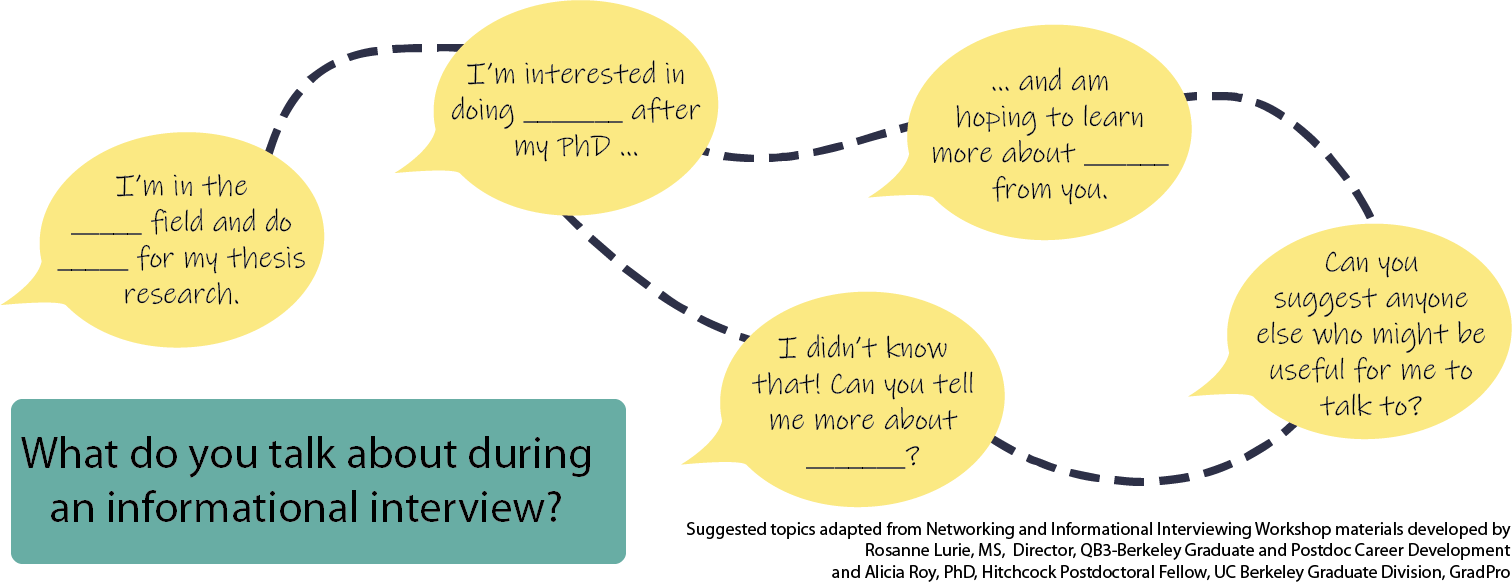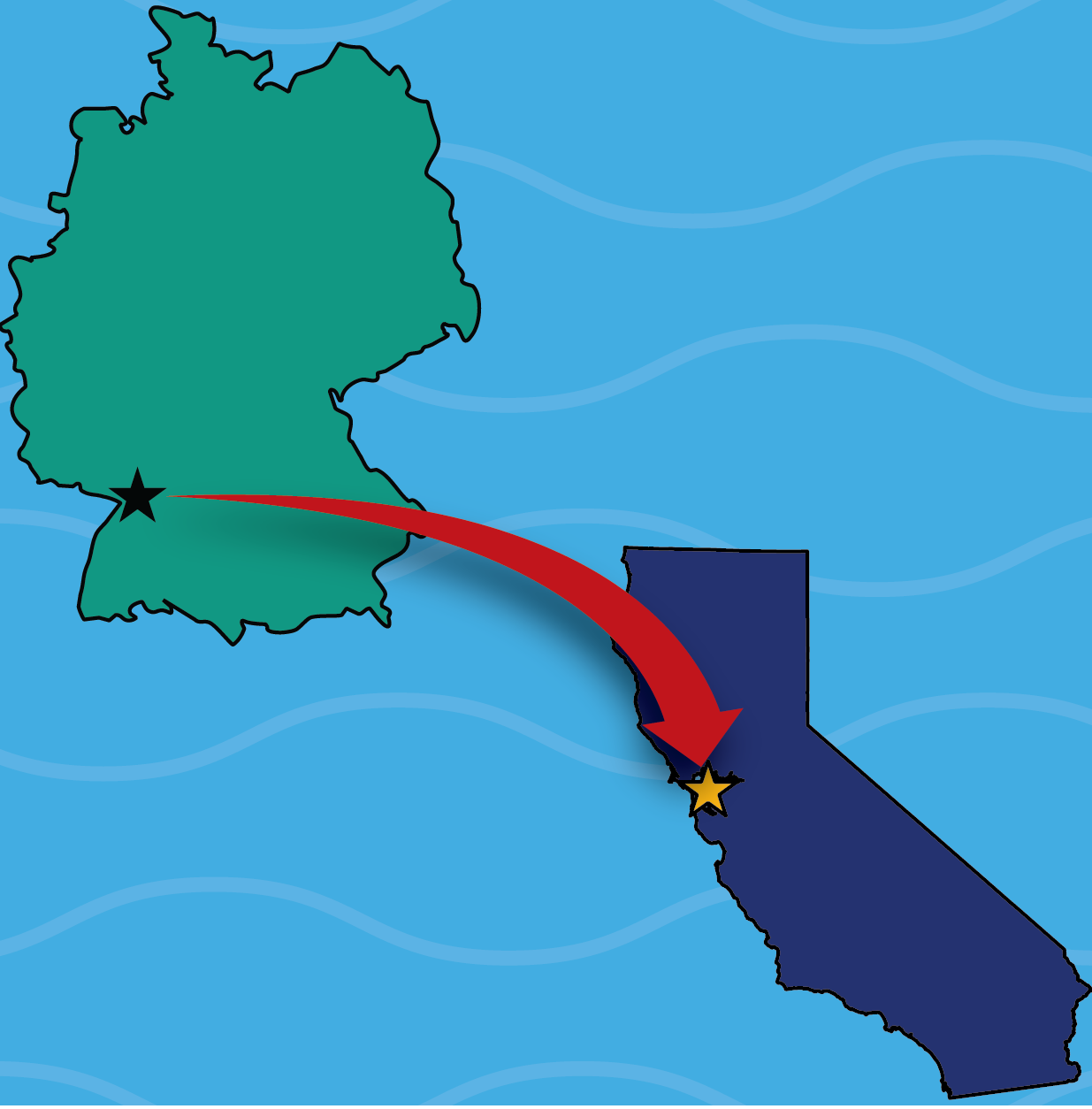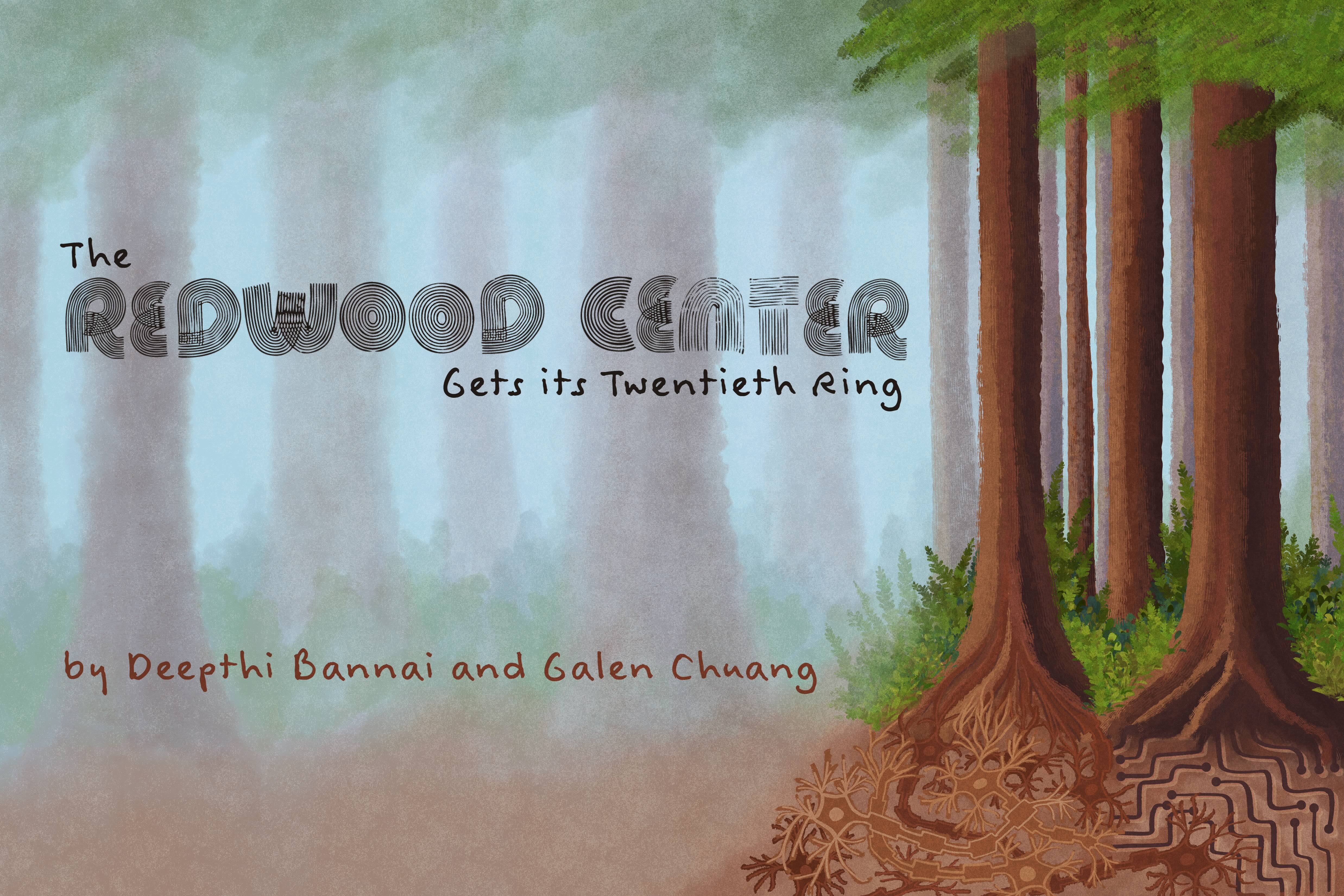The Ins and Outs of Informational Interviewing

You may have come across the term “informational interview” at some point during grad school. In fact, you may have already conducted informational interviews without realizing it! Talking to a professor about the academic hiring process or asking a former lab member what their life in industry is like are just a few types of informational interviews that can arise naturally for a grad student in STEM. Conducting informational interviews throughout grad school is fantastic for illuminating different sorts of post-PhD career opportunities, as well as for establishing a professional network for the future.
So, what is informational interviewing? Simply put, it’s the process of having a conversation with someone about their career, usually to seek career advice or to learn more about a particular field. In academia, this commonly happens during typical mentor-mentee relationships—postdoc/grad student, advisor/grad student, etc. For example, having a conversation with a junior faculty member about their experience applying to tenure-track positions provides first-hand perspective on the academic job market.
However, for grad students, informational interviewing is arguably even more useful when talking with people outside of academia. While grad school tends to give students an adequate understanding of the academic job market, many departments do a comparatively poorer job of educating their trainees on non-academic careers, despite that fact that the majority of STEM PhDs ultimately never end up in tenure-track faculty positions.
Informational interviewing is a good way to fill this knowledge gap and learn more about the myriad careers available to someone with a graduate degree. For example, a cursory search for jobs that employ STEM PhDs includes professions like consultant, science writer, patent agent, educator, program manager, and university administrator—these positions all value a PhD but may not be obvious options to a grad student immersed in dissertation research. Having a one-on-one conversation with someone currently working in one of these fields can provide invaluable guidance for post-PhD possibilities, whether it’s learning about the lifestyle of a management consultant or asking about the career progression of a university dean.
“Compared to just reading articles, blogs, or websites,” says Rosanne Lurie, the director of Graduate and PostDoc Career Development at QB3-Berkeley, “informational interviews generally give you substantive, reliable ‘inside-scoop’ career information, and are significantly less time consuming than being an intern. They hit a sweet spot of efficiency in your career planning efforts.”
Beyond gathering information, informational interviewing is a fantastic and organic way to grow your own professional network. This holds doubly true for grad students considering a career beyond academia, in industries where academic contacts might not be as helpful. By casting nets in fields that you’ve considered entering in the future, you can begin establishing professional contacts that may prove useful when searching for a job. After all, most jobs are obtained primarily through networking.
Nevertheless, networking can feel like a daunting, even random, affair—after all, who knows if that spontaneous coffee break chat at a conference could lead to a future career? “Informational interviewing is a more formal approach to connecting with other people that doesn’t require extroversion,” Lurie points out. Instead, it just necessitates “a bit of thoughtfulness and planning.”
 Who could you interview? It’s easiest to start with your personal contacts and to ask them to introduce you to people in their own personal networks. You can also cold-contact people via email or LinkedIn but that is less likely to yield a response.
Who could you interview? It’s easiest to start with your personal contacts and to ask them to introduce you to people in their own personal networks. You can also cold-contact people via email or LinkedIn but that is less likely to yield a response.
So, how do you go about conducting an informational interview? The first step is to identify someone you’d like to talk to. For example, if you’re curious about what a career in science communication is like, you might want to reach out to a science writer to ask them about their professional life. Or, if you’re thinking of relocating from Berkeley to Seattle, you might consider chatting with a contact in Seattle to start growing a network there. Whatever the reason, it’s crucial to identify your interviewee. It’s generally easiest to start with personal contacts—friends, labmates, cohort members, etc.—or to ask them to introduce you to people outside of your immediate network. When all else fails, cold-contacting people through email or LinkedIn is another possibility, albeit one that is generally less successful than utilizing your existing network. Importantly, you will need to make it clear that 1) you’re primarily interested in information gathering, and not asking for a job, and 2) you’re hoping for a short chat that won’t take up too much time—thirty minutes or less is a good rule of thumb. Many people will happily agree to this sort of informal conversation.
 What are the key elements of an informational interview? (1) Prepare specific question(s) you have that your interviewee can help answer. (2) Keep it short and sweet, around 30 minutes. (3) Do not ask your interviewee for a job.
What are the key elements of an informational interview? (1) Prepare specific question(s) you have that your interviewee can help answer. (2) Keep it short and sweet, around 30 minutes. (3) Do not ask your interviewee for a job.
Regarding the interview itself, preparation is key. Because the conversation might be short, it’s crucial that you know ahead of time what you’re hoping to get out of the interaction, be it career advice, field-specific knowledge, or something else. “Be prepared not just to ask questions,” Lurie advises, “but to talk about yourself in relation to the interests of the [interviewee] and even the organization where they work.”
At the same time, it’s good to avoid over-preparing, and to let the conversation flow organically. “Sometimes you don’t know what you don’t know, and you may learn something unexpected that is valuable,” Lurie says, “such as a type of career or organization you did not know existed.” Towards the end, you may want to ask your interviewee if they have suggestions for other people who would be useful to talk to. This is a way to learn more about people in your field of interest, and to grow your own network naturally.  What do you talk about during an informational interview? Start the conversation by introducing yourself and what type of research you are doing during your PhD. Informational interviews work best when you then articulate a specific career-related question that you believe your interviewee can help answer. Allow the conversation to flow and be open to new topics or information that your interviewee brings up. Finally, always end the conversation by asking if your interviewee can suggest other people you should talk to. (Figure adapted from Networking and Informational Interviewing workshop materials developed by Rosanne Lurie, MS, Director, QB3-Berkeley Graduate and Postdoc Career Development and Alicia Roy, PhD, Hitchcock Postdoctoral Fellow, UC Berkeley Graduate Division, GradPro.)
What do you talk about during an informational interview? Start the conversation by introducing yourself and what type of research you are doing during your PhD. Informational interviews work best when you then articulate a specific career-related question that you believe your interviewee can help answer. Allow the conversation to flow and be open to new topics or information that your interviewee brings up. Finally, always end the conversation by asking if your interviewee can suggest other people you should talk to. (Figure adapted from Networking and Informational Interviewing workshop materials developed by Rosanne Lurie, MS, Director, QB3-Berkeley Graduate and Postdoc Career Development and Alicia Roy, PhD, Hitchcock Postdoctoral Fellow, UC Berkeley Graduate Division, GradPro.)
After the interview, it’s important to follow up. This means reviewing the interaction and processing what you’ve learned, how it helps in your career exploration, and what points you might want to inquire about in the future. Additionally, it’s polite to send an appreciative note to your interviewee thanking them for their time, and to follow through on any actions you may have discussed during your interview (e.g. connecting via LinkedIn, making an email introduction, etc.). On the longer timescale, it’s good practice to stay in touch with your interviewees to keep them updated on your own situation and how the conversation has impacted you. “Remember, this connection is mutual,” says Lurie, “[and] at some point in the future, you may find you are helpful to them, as they have been for you.”
------- Jonathan Liu is a graduate student in physics





